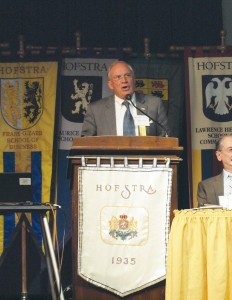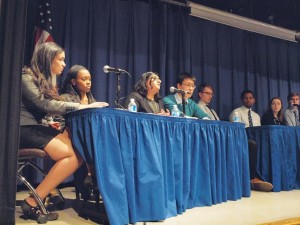By Ehlayna NapolitanoNEWS EDITOR
In the weeks leading up to the 12th Presidential Conference, one of the most-talked about details of the George W. Bush Conference was the absence of the man himself.
For three days last week, speakers from across the country converged on Hofstra’s campus to provide insight and discussion about the eight years of the Bush presidency. Guests included former members of Bush’s administration, as well as professors and authors offering expert perspectives.
Topics ranged from examinations of Bush’s “compassionate conservatism” to the leadership of the First Lady, Laura Bush. Speakers’ views on the Bush presidency also varied, with some granting the former president praise and sympathy, while others accused him of war crimes and gross injustices.
Among the critics was Dr. Carolyn Eisenberg, a history professor at Hofstra and member of the conference committee. She expressed frustration with the Bush administration for a lack of cooperation with the committee in planning the event.
“One problem for conference planners was in order to get these officials to attend, some needed assurance that they would not face direct challenge,” Eisenberg said, noting that previous presidents and administrations had had “no problem” with open discussion.
“However, that unwillingness was at odds with University norms. A free exchange of ideas is at the heart of our mission. And my own view was that if Bush officials were unwilling to engage in free discussion, they should not be welcomed,” Eisenberg said.
But conference director Dr. Meena Bose, who is a political science professor at Hofstra, said that there was cooperation between the Bush administration and the planning committee. Further, Bose, who is also the director of the Peter S. Kalikow Center for the Study of the American Presidency, stated that the “comprehensive” process in planning the conference ultimately accomplished the committee’s goal of examining the “consequential” presidency of George W. Bush.
Although she stated that the committee had hoped that former President Bush himself would attend the conference, he was ultimately unable to do so. She said, however, that the array of experts, journalists and administration officials who did attend provided much insight into the historical perspective of the presidency and how and when decisions were made.
“You really get a fuller portrait of a presidency,” Bose said.
Students were also involved in the conference. Some served as ambassadors who accompanied guests on campus, and others participated in a student-led panel on Tuesday. Denisse Girón, a junior history and sociology major, was a part of the event that discussed the Afghanistan War.
Girón was not initially planning on being involved in the event at all.
“Although no presidency goes without fault, I didn’t like the thought that we would be hosting a bunch of war criminals on campus,” Girón said. “I also didn’t want to be on the student panel because I don’t think it’s a debate – we failed to make the lives of Afghans better and continue to keep a disastrous presence there.”
However, Girón felt that the conference overall was an important event that could ultimately culminate in broader lessons.
“I think it’s so important to assess the work of each president and his administration, but then, as Amy Goodman said, to move from assessment to accountability,” Girón said. She commended the organizers of the event for devoting a great amount of time and effort to putting together the conference.
Maryum Alam, a junior political science and biology major, also participated in the student panel. She felt that the topic of the Afghanistan war was a particularly important and interesting topic.
“I studied this conflict in detail in some of my classes and was ecstatic to know that my fellow students were also interested in discussing such a topic,” Alam said. She said that she volunteered for the event – and the panel more specifically – right away. “I wanted my voice to be heard,” she added.
For Alam, the discussions held were crucial in defining the importance of an event like the Bush Conference. Analyzing a presidency, Alam said, was always an important academic and historical pursuit. Given the circumstances of Bush’s presidency – including events like September 11, the Iraq and Afghanistan invasions and Hurricane Katrina – Alam felt that the much-criticized presidency was an important one to reflect upon.
“It is through serious, academic discussion, such as those held during the Bush Conference, that we can better try to understand the multifaceted nature of presidential decision-making. More importantly, conferences like these can help to debunk the many myths about presidents that are promulgated through the media,” Alam said.
Organizers also felt that the conference was an important academic pursuit. According to Bose, many of the panelists at the conference told her that they had enjoyed engaging with students. She also stated that she felt the turnout was good.
“I think all of the discussions were very productive,” Bose said.
Eisenberg also felt that the conference was a good opportunity for students, but held reservations that a lack of “free discussion” limited the ability of the conference to examine some harder issues, including the topic of war crimes. “I think the experience of the conference was valuable to students. Although, everyone would have benefited more by open-ended discussion that involved the principle officials. However, the closed nature of the Bush Administration was a problem that preceded Hofstra,” Eisenberg said.
“The purposes of these conferences continue to be worthwhile,” Bose said. “… It’s not the last word… but it’s part of the oral history of the Bush presidency.”




